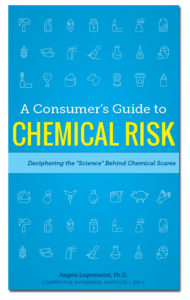No single study settles any scientific issue. Rather, science is a long process of discovery that brings us closer to an answer as an issue is examined time and again. Part of that process involves repeating specific studies to see whether different scientists or teams of scientists can reproduce results of their peers’ or even their own research. This process reduces the probability that an accidental association is taken as gospel on an issue. In fact, many “groundbreaking” studies have eventually been debunked because other researchers could not produce the results.
For example, some researchers have been trying to build the case that the chemical Bisphenol A (BPA), which makes hard clear plastics and resins that line food cans, can disrupt human hormone systems and basically program our genes to make us fat. They call such chemicals “obesogens,” and one of their strongest pieces of evidence were studies on lab rodents where BPA exposure was associated with increased body fat on the animals. But when other researchers tried to reproduce this result, they simply couldn’t do it. The second study not only failed to reproduce the results, it was larger and more scientifically robust.
Browse the terms on the sidebar of this webpage for more details and/or download a copy of A Consumer’s Guide to Chemical Risk: Deciphering the “Science” Behind Chemical Scares.


